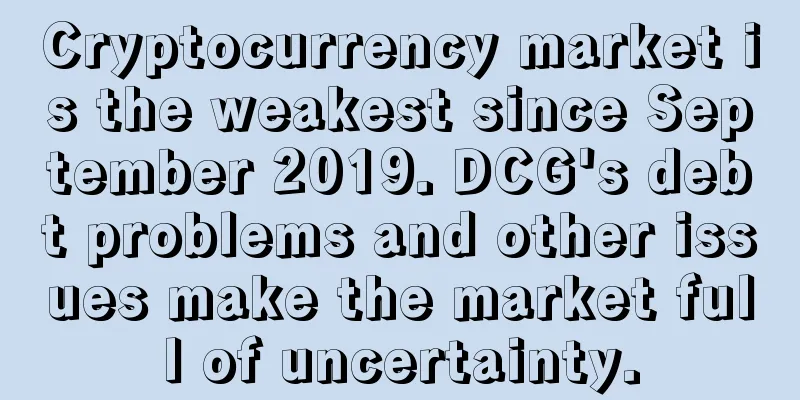Cryptocurrency market is the weakest since September 2019. DCG's debt problems and other issues make the market full of uncertainty.

|
I. Macroeconomics and Financial Markets On May 22, the Dow Jones Industrial Average fell $140 (0.42%) from the previous trading day in New York, while the Nasdaq Composite Index closed up 62.8 points (0.5%). As speculation about the Federal Reserve System's tightening of monetary policy continues to grow about pausing interest rate hikes, St. Louis Fed President James Bullard, known for his hawkish stance, said on the 22nd, "We should raise interest rates and cut interest rates by two more 0.25% this year." Jamie Dimon, CEO of JPMorgan Chase Bank, said that US interest rates could rise further to 7% from the current 5%. At present, the June meeting of the US Federal Open Market Committee (FOMC) is likely to be the focus. On the debt ceiling issue, President Biden and U.S. House Speaker Kevin McCarthy are continuing negotiations on raising the debt ceiling, but are still struggling to reach an agreement. Treasury Secretary Janet Yellen has sent a letter warning that the United States is at risk of default in as early as 10 days. If negotiations drag on until the last minute of a deadline, past experience could shake trust in U.S. (government bonds). If it leads to a sharp increase in short-term borrowing costs or a downgrade in credit ratings, it is likely to spread to the financial and economic world outside the United States, and private enterprises such as banks will be hit. Financial instability will have a serious impact. 2. Cryptocurrency Market In the crypto asset (virtual currency) market, Bitcoin rose 1.3% from the previous day to $27,020. There were also some solid price moves that went against the view of the bears, who expected a sharp drop against the backdrop of technical weakness, such as lower top prices. The second-largest market cap Ethereum (ETH) also rebounded 1.95% from the previous trading day, in a stalemate. As market participants’ interest declined, weekly trading volumes for both BTC and ETH hit record lows since September 2019, with thin trading continuing. According to the latest weekly report from asset management company CoinShares, institutional investors' capital flows in cryptocurrency investment products have seen a net outflow of $32 million for the fifth consecutive week. Weekly trading volume on major exchanges fell to $20 billion, the lowest level since the end of 2020. That is in stark contrast to the Tokyo stock market, where safe-haven money from foreign investors is flowing into the stock market amid concerns about credit crunch risks such as bank instability following the coronavirus crisis. According to data from the Japan Exchange Group (JPX), overseas investors have been net buyers of Japanese stocks for seven consecutive weeks, with a cumulative net purchase of 3 trillion yen. The Nikkei 225 Index has reached its highest level in 33 years since the bubble economy. Against the backdrop of drying up liquidity in the cryptocurrency market and rising interest rates, Bloomberg Intelligence strategist Mike McGlone is one of the pessimistic forecasters. In the event of a further deterioration in the macro environment, he expressed a pessimistic view that the price level in 2019 (1 BTC = $7,000), which was the starting point of the previous bull market, may fall. 3. DCG failed to repay its possible debts According to a statement from cryptocurrency exchange Gemini, debts due to bankrupt and insolvent lender Genesis Global Capital came due as of last week. Genesis has lost more than $35 billion to various creditors, affected by the default of venture capital firm Three Arrows Capital (3AC), which went bankrupt last year, and the collapse of major cryptocurrency exchange FTX, according to court documents. Gemini and the Unsecured Credit Committee are considering a moratorium on payments, but if Digital Currency Group is deemed to be in effective default, it will become more difficult to raise funds due to the decline in creditworthiness, and there are concerns about bankruptcy risk. If DCG, the leading conglomerate in the crypto asset (virtual currency) industry, goes bankrupt, it will face the sale of assets such as Grayscale's investment trust "GBTC" as part of its debt consolidation, which will have a wide-ranging impact on the market. It is possible that this will lead to the forced sale of assets such as Grayscale's investment trust "GBTC", triggering a large-scale sell-off, which may have a huge impact on the entire crypto asset market. In addition, DCG also owns well-known cryptocurrency-related companies such as CoinDesk, CoinMarketCap, and Grayscale, and the future of these companies will also be affected. If DCG goes bankrupt, the confidence and stability of the entire cryptocurrency industry will also be hit. Therefore, the risk of DCG bankruptcy is not only an impact on the company itself, but may also cause a chain reaction to the entire cryptocurrency market. |
Recommend
Belly button analysis of your fortune
Belly button analysis of your fortune The navel i...
Illustration of truncated nose
Truncated nose wealth Characteristics of a trunca...
Is it good for a woman with a wide mouth to be a strong woman?
A wide mouth actually means a big mouth. For many...
Palmistry test Scan, how is your palm?
Artificial intelligence is becoming more and more ...
Plump people are more blessed
In this era where thinness is considered beautifu...
Can Uniswap V3 build a moat and subvert the existing ecosystem?
This is the 1373th original issue of the Vernacul...
Five must-read takeaways from the UK government’s blockchain report
“Human progress is marked by the rise of new tech...
Most cheating women have these features on their faces. How to tell if a woman will cheat?
For most male friends, whether they are looking f...
Strict regulation of virtual currencies has more advantages than disadvantages
Virtual currencies appear to be bracing for a sto...
Goldman Sachs applies for new blockchain patent for foreign exchange market, and large companies begin to grab blockchain patents
For traders at large financial institutions, curr...
Is a big nose auspicious? What does a woman’s big nose mean?
Judging from the facial features of the big nose a...
Is it good to have a mole on the tip of the nose? What does a mole on the tip of a man's or a woman's nose mean?
Is it a good thing to have a mole on the tip of t...
What does a person who cares about small favors look like?
Nowadays, many people attach great importance to ...
Bitfinex announces successful repayment of stolen Bitcoins from previous attack
On April 4, the world-renowned Bitcoin exchange B...
Security Guide | A Brief Analysis of the Bitcoin Arbitrary Theft Vulnerability
This issue's vulnerability topic is Bitcoin v...









